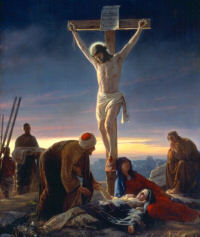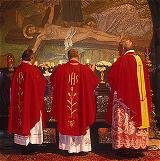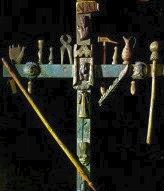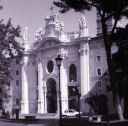Into your hands I commend my spirit. (Psalm 31:6)
It’s Good Friday, the very day for which Jesus was born into the world. His whole life, everything he ever said or did, had been leading up to this day. Every miracle, every sermon, every word of forgiveness or challenge—none of them makes sense apart from the cross. And today, we are invited to join millions of people all over the world in gazing upon the Lamb who was slain for our sin.
So let’s follow Pilate’s words and “behold the man” (John 19:5). Come and behold the Christ in his humanity. Recall his humble beginnings as a newborn in a manger. Wonder at his hidden years as he grew in stature and grace.
Come and behold the One on whom the Holy Spirit rested as a dove. See him in his humility, trust, and surrender to his Father as he walked with God each and every day. Behold the One who prayed, “Into your hands I commend my spirit” (Psalm 31:6). See how this prayer, which he breathed with his dying breath, was but the full expression of a lifetime of yielding to his Father.
Come and behold the One who said, “I thirst” (John 19:28). Gaze upon the One who experienced hunger, thirst, and pain, both physically and spiritually. He came not to be served but to serve. He washed his friends’ feet. He dined with sinners and touched lepers. He poured out his life day after day for his people. And now here he is, crucified, betrayed, and abandoned. He is nailed to a cross, and he is still pouring out his life.
“Behold, your king!” (John 19:14). Before his pierced and bloodstained feet, we bow our knees, anticipating the day when every person will kneel before him. Look upon this ravaged rabbi, and see here your eternal King, the One through whom all things were created. See your high priest seated in heaven, even now constantly interceding for you, just as he did on the cross.
Behold Jesus. The sky blackens. The earth shakes. The rocks rend. His body lies still for now. His majesty is emptied but for a season. Here is your King.
“Jesus, into your hands I commend my spirit.”
Isaiah 52:13–53:12; Psalm 31:2, 6, 12-13, 15-17, 25; Hebrews 4:14-16; 5:7-9

 According to the Church's ancient tradition, the sacraments are not celebrated on Good Friday nor Holy Saturday. "Celebration of the Lord's Passion," traditionally known as the "Mass of the Presanctified," (although it is not a mass) is usually celebrated around three o'clock in the afternoon, or later, depending on the needs of the parish.
According to the Church's ancient tradition, the sacraments are not celebrated on Good Friday nor Holy Saturday. "Celebration of the Lord's Passion," traditionally known as the "Mass of the Presanctified," (although it is not a mass) is usually celebrated around three o'clock in the afternoon, or later, depending on the needs of the parish. This is a day of mourning. We should try to take time off from work and school to participate in the devotions and liturgy of the day as much as possible. In addition, we should refrain from extraneous conversation. Some families leave the curtains drawn, and maintain silence during the 3 hours (noon — 3p.m.), and keep from loud conversation or activities throughout the remainder of the day. We should also restrict ourselves from any TV, music or computer—these are all types of technology that can distract us from the spirit of the day.
This is a day of mourning. We should try to take time off from work and school to participate in the devotions and liturgy of the day as much as possible. In addition, we should refrain from extraneous conversation. Some families leave the curtains drawn, and maintain silence during the 3 hours (noon — 3p.m.), and keep from loud conversation or activities throughout the remainder of the day. We should also restrict ourselves from any TV, music or computer—these are all types of technology that can distract us from the spirit of the day. 